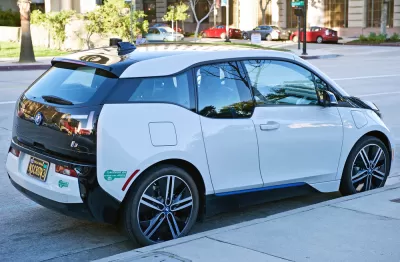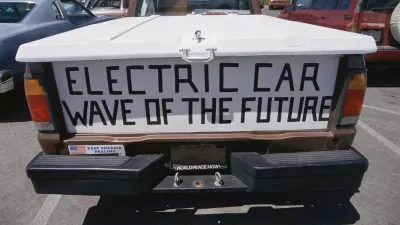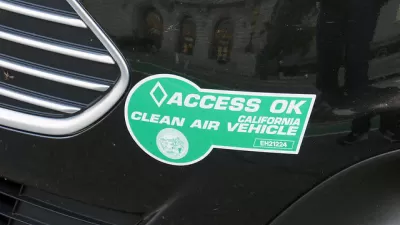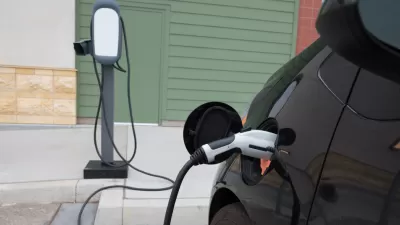On the final day of the legislative session, the California Legislature approved a budget bill that directs $1.5 billion in carbon auction revenues. A prior post described a bill that would have quadrupled state EV rebates: but it died.

The budget for the oversubscribed Clean Vehicle Rebate Project, which has "a waiting list for most consumers to receive a rebate," will be replenished with $140 million due to the passage on Sept. 15 of budget bill AB 134, reports Julie Cart for CALmatters, "a nonpartisan, nonprofit journalism venture committed to explaining how California’s state Capitol works..."
Gov. Jerry Brown signed the bill Saturday. The $140 million "matches his proposed amount to keep the rebate program going," adds Cart. It was included in an agreement reached last week on how to divide the $1.5 billion.
[For more information on where the "[n]early $5 billion [that] has flowed into the state’s unique Greenhouse Gas Reduction Fund since 2013," see Cart's earlier article.]
As for Assembly Bill 1184 by Assemblyman Phil Ting (D-San Francisco) which was intended to equalize prices for electric and gas-powered compact cars, potentially quadrupling rebate amounts, "[c]ritics complained it failed to identify where the money would come from," adds Cart.
While the bill was defeated, its author wasn't.
“Unfortunately, we ran out of time this year to reach an agreement but our need to act remains clear,” Ting said in a statement..."Our state must play an active role in facilitating the shift to zero-emission vehicles through a more aggressive rebate program."
He has a point. "Conversations about adoption of electric cars generally include two issues: the availability of rebates to purchase the cars and charging stations to run them," writes Cart.
While the rebate amounts won't be increasing, except for low and moderate income consumers who are entitled to an extra $2,000, thanks to Senate Bill 1275 (2014), The Charge Ahead California Initiative, the number of charging station will be increasing due to the 'dieselgate settlement' negotiated by Volkswagen, California Air Resources Board, et.al. in July.
But even with the addition of the VW charging infrastructure, the company’s total contribution will only amount to about 10 percent of the stations that California will eventually need, according to the air board
State's environmental ethos falls short when applied to motor vehicles
Consumers seem to prefer trucks and SUVs, and lower gasoline prices have meant they don’t pay a penalty at the pump. As a market share, [zero emission vehicles] represent less than 5 percent of new cars sold in the state.
Perhaps Assemblyman Ting would be better served if he looked at sources other than additional carbon cap-and-trade revenues to supplement current rebate amounts.
For example, Gov. Kate Brown (D-Ore.) signed into law last month a landmark transportation funding bill that adds a 1/2-cent sales tax, in a state that has no sales tax, no less, but just on new passenger vehicle sales to establish a new Zero-Emission Incentive Fund to support two electric vehicle (EV) rebate programs on par with its southern neighbor.
A better program would be to reattempt legislation tried seven years ago: a 'feebate' system which would have Chevy Tahoe purchasers lower costs for those purchasing Chevy Bolts, Volts, and Sparks, so limited cap-and-trade proceeds could be used for other measures to reduce greenhouse gas emissions.
FULL STORY: California tries to goose electric car sales with rebates—but is it enough?

Alabama: Trump Terminates Settlements for Black Communities Harmed By Raw Sewage
Trump deemed the landmark civil rights agreement “illegal DEI and environmental justice policy.”

Study: Maui’s Plan to Convert Vacation Rentals to Long-Term Housing Could Cause Nearly $1 Billion Economic Loss
The plan would reduce visitor accommodation by 25% resulting in 1,900 jobs lost.

Why Should We Subsidize Public Transportation?
Many public transit agencies face financial stress due to rising costs, declining fare revenue, and declining subsidies. Transit advocates must provide a strong business case for increasing public transit funding.

Paris Bike Boom Leads to Steep Drop in Air Pollution
The French city’s air quality has improved dramatically in the past 20 years, coinciding with a growth in cycling.

Why Housing Costs More to Build in California Than in Texas
Hard costs like labor and materials combined with ‘soft’ costs such as permitting make building in the San Francisco Bay Area almost three times as costly as in Texas cities.

San Diego County Sees a Rise in Urban Coyotes
San Diego County experiences a rise in urban coyotes, as sightings become prevalent throughout its urban neighbourhoods and surrounding areas.
Urban Design for Planners 1: Software Tools
This six-course series explores essential urban design concepts using open source software and equips planners with the tools they need to participate fully in the urban design process.
Planning for Universal Design
Learn the tools for implementing Universal Design in planning regulations.
Smith Gee Studio
Alamo Area Metropolitan Planning Organization
City of Santa Clarita
Institute for Housing and Urban Development Studies (IHS)
City of Grandview
Harvard GSD Executive Education
Toledo-Lucas County Plan Commissions
Salt Lake City
NYU Wagner Graduate School of Public Service





























